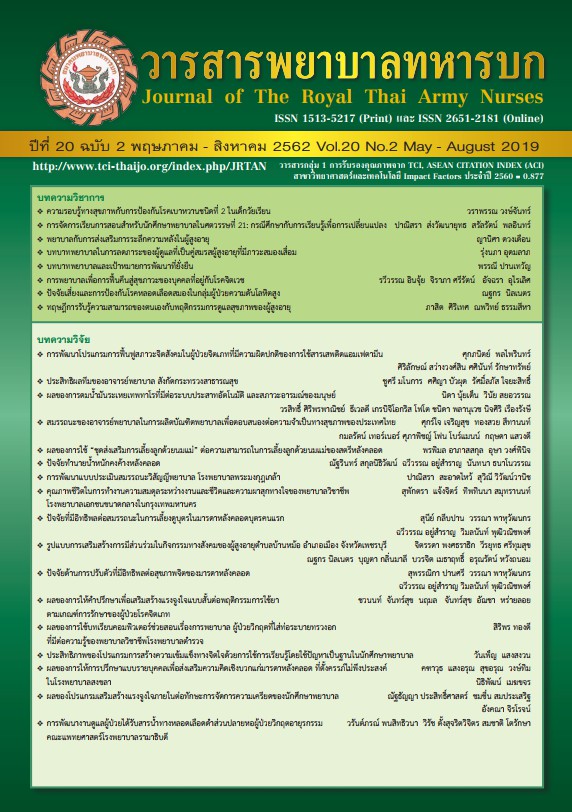Effectiveness of “Breastfeeding Support Package” to The Ability to Breastfeed among Postpartum Women
Keywords:
Breastfeeding, Breastfeeding Support Package, Postpartum womenAbstract
Effectiveness of “Breastfeeding Support Package” to the ability to breastfeed among postpartum women This Quasi-experimental research (two groups) was aimed to evaluate the effectiveness of “Breastfeeding Support Package” (BFSP) to the ability to breastfeed among postpartum women. Participants were mothers admitted to the postpartum wards. There were 80 mothers, 40 each in both the control and study group. Participants in the control group were assigned to receive routine standard care to promote breastfeeding whereas the study group received “BFSP”. The questionnaires and interview were used for collecting the data. Descriptive statistics were used for analyzing the data. The results revealed that mothers in the study group had a higher rate to achieve exclusively breastfeed their child up to six months than mothers in the control group (57.50 % VS. 30.00%). Moreover, the mean score of knowledge related to breastfeeding in the study group was statistically significantly higher than those in the control group ( = 19.02, 17.42 respectively; p<.05). The mean score of perception of self-efficacy to breastfeed among the two groups was not significantly different (p<.05).
Downloads
References
2. Office of the Prime Minister. The twelfth national economic and social development plan (2017-2021). Bangkok: Office of the National Economic and Social Development Board (NESDB); 2017. (in Thai).
3. Ministry of Digital Economy and Society. Survey children’s and women’s situation project in Thailand 2015-2016. Bangkok: National Statistic Office; 2017. (in Thai).
4. Renfrew MJ, Mc Cormick FM, Wade A, Quinn B, Dowswell T. Support for healthy breastfeeding mothers with healthy term babies. Cochrane Database Syst Rev. 2012;5: 1-142.
5. Kupratakul J, Taneepanichskul S, Voramongkol N, Phupong V. A randomized controlled trial of knowledge sharing practice with empowerment strategies in pregnant women to improve exclusive breastfeeding during the first six months postpartum. J Med Assoc Thai. 2010;93 (9): 1009-1018.
6. Apartsakun P. Thai women’s breastfeeding experiences and support needs [Doctoral dissertation]. Southampton: Southampton University; 2015.
7. Bandura A. Social learning theory. Englewood Cliffs, NJ: Prentice-Hall; 1977.
8. Polit DF, Beck CT. Essentials of nursing research: appraising evidence for nursing practice. Philadelphia: Lippincott Williams & Wilkins; 2010.
9. Khakong S, Nirattaradhorn M. The Effects of Promoting Self-Efficacy Program on Breast Feeding Behavior among Adolescent Mothers in Community. Journal of Public Health. 2017;47 (1): 31-43. (in Thai).
10. Dennis CL. The Breastfeeding Self-Efficacy Scale: Psychometric assessment of the short form. J Obstet Gynecol Neonatal Nurs. 2003;32 (6): 734-744.
11. Polit D, Hungler B. Nursing research: principle and method. 6th ed. Philadelphia: Lippincott; 1999.
12. Chinapandhu P, Meenasantirak A, Perpornsakul J, Saengpang L. Effects of the making nipple innovation to the successful of breastfeeding in postpartum mothers with short nipples. Journal of The Royal Thai Army Nurses. 2018;19 (3): 185-194. (in Thai).
13. Hauck YL, Fenwick J, Dhaliwal SS, Butt J, Schmied V. The association between women’s perceptions of professional support and problems experienced on breastfeeding cessation: a Western Australian study. J Hum Lact. 2011;27 (1): 49–57.
14. Panyim K, Kantaruksa K. Effectiveness of Implementing Best Practice Guidelines for Breastfeeding Promotion, Phobphra Hospital, Tak Province. Nursing Journal. 2012;39 (2): 66-78. (in Thai).
15. Tangsuksan P, Ratinthorn A. Experience and contextual factors related to exclusive breastfeeding in full-time working mothers. Journal of Nursing Science. 2011;3 :52- 63. (in Thai).
16. Alden KR. Newborn Nutrition and feeding. In: Lowdermilk DL, Perry SE, Cashion K, Perry LE. Maternity & women’s health care. 10th ed. St. Louis: Mosby; 2012. p. 606-634.
Downloads
Published
How to Cite
Issue
Section
License
บทความหรือข้อคิดเห็นใดใดที่ปรากฏในวารสารพยาบาลทหารบกเป็นวรรณกรรมของผู้เขียน ซึ่งบรรณาธิการหรือสมาคมพยาบาลทหารบก ไม่จำเป็นต้องเห็นด้วย
บทความที่ได้รับการตีพิมพ์เป็นลิขสิทธิ์ของวารสารพยาบาลทหารบก
The ideas and opinions expressed in the Journal of The Royal Thai Army Nurses are those of the authors and not necessarily those
of the editor or Royal Thai Army Nurses Association.






